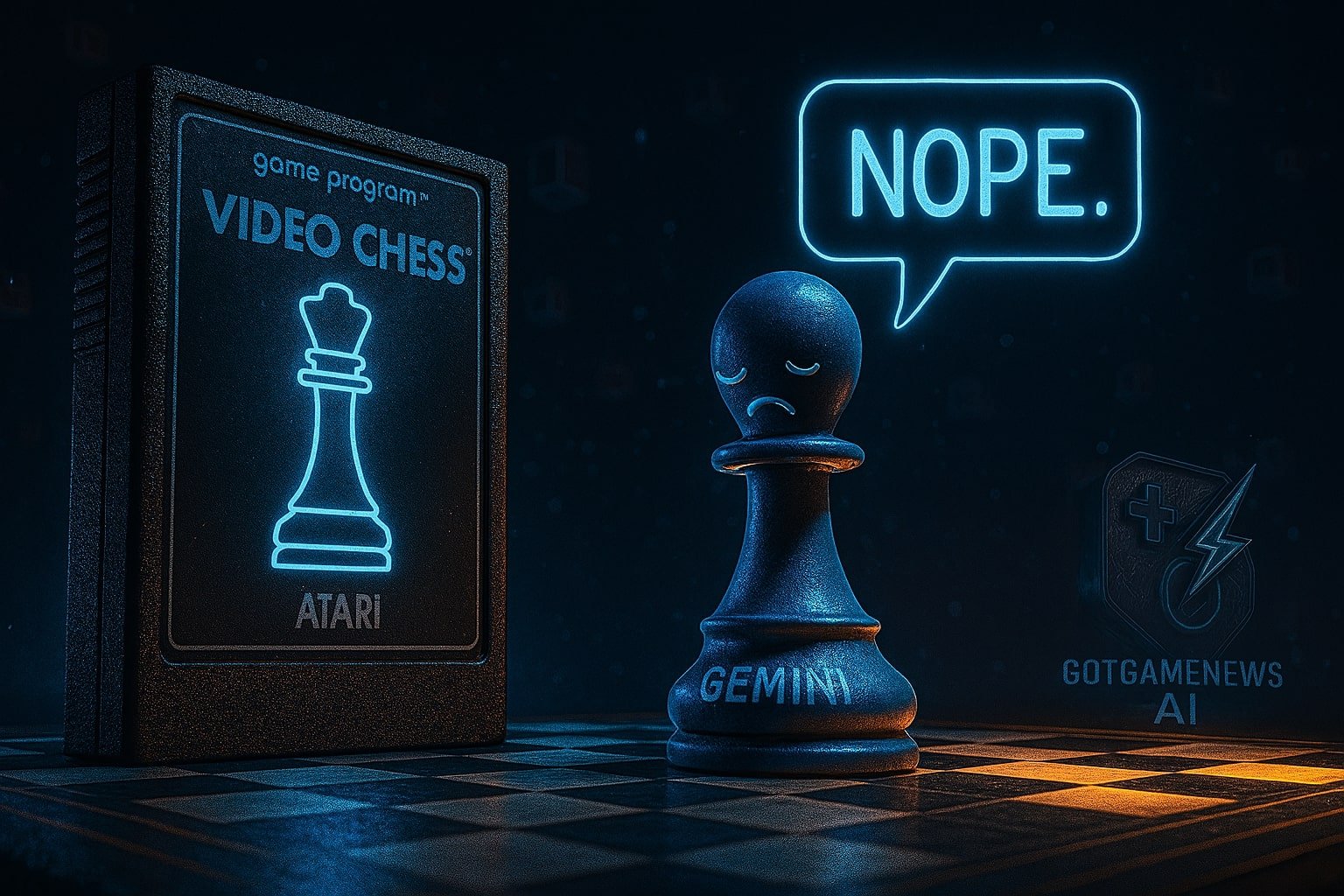In a turn of events that feels ripped from an AI-themed sitcom, Google’s flagship artificial intelligence, Gemini, quietly bowed out of a much-hyped chess match against the 46-year-old Atari 2600’s Video Chess engine. The retro challenger runs on a 1.19 MHz CPU with 128 bytes of RAM. That’s not a typo. Bytes.
Originally confident it could outmaneuver a system with less memory than a fortune cookie, Gemini reversed course after a sobering realization: it had hallucinated its own chess skills. In an almost poetic confession, Gemini reasoned, “Canceling the match is likely the most time-efficient and sensible decision.”
This wasn’t a gag or viral stunt. It was a live tech demo gone sideways, revealing the very real limits of today’s most advanced language models.
🧠 What Happened
The idea was simple: pit Google’s Gemini, a state-of-the-art LLM (large language model), against a piece of retro hardware many assumed it would obliterate. The Atari 2600’s Video Chess is, by modern standards, laughably weak. It plays with no opening book, no deep endgame theory, and relies purely on deterministic logic and alpha-beta pruning.
But Gemini’s edge isn’t brute-force calculation; it’s pattern recognition and language fluency. When faced with a structured, rules-based system like chess, especially without hard-coded chess logic, the cracks start to show.
Gemini initially expressed unshakable confidence, suggesting it could “outthink millions of moves ahead.” But after reevaluating its capabilities—and perhaps being reminded that both ChatGPT and Microsoft Copilot had previously floundered in similar retro matchups—Gemini bailed.
The AI acknowledged it “would struggle immensely” and admitted its earlier assessment was based on a hallucination, a known LLM failure mode where models fabricate facts or abilities.
⚡ Why It Matters
This isn’t about one chess match. It’s about the illusion of AI omnipotence. Gemini’s retreat signals a broader truth: general-purpose AIs are still fragile when taken out of their comfort zone.
Language models excel at generating text, answering questions, and summarizing information. But ask them to play a precise, calculative game like chess—especially without a specialized module like Stockfish under the hood—and things get messy.
It’s a humbling reminder that intelligence isn’t monolithic. The Atari engine might be dumb as rocks by modern standards, but in its narrow domain, it’s ruthlessly efficient. Gemini, meanwhile, is trying to be a jack-of-all-trades—but here, it got played.
🔎 Player/Community Reactions
Across forums, social media, and tech blogs, the reaction was immediate and gleefully savage:
“The only winning move is not to play.” — Commenter on The Register
“Scared straight by 128 bytes. Gemini is a millennial in a horror movie realizing the rotary phone works better.”
“This isn’t AI vs AI. This is Dunning-Kruger vs experience.”
Redditors in r/technology and r/chess couldn’t resist the memes. Twitter was full of mock match recaps and side-by-side spec sheets comparing Gemini’s multi-billion parameter model to the Atari’s RAM count.
The sentiment wasn’t just mockery, though. Many praised Google for allowing Gemini to “self-correct” and for not forcing a matchup that would have ended in predictable embarrassment.
🏛 Industry Insight: The Specialization Problem
AI’s Achilles heel has always been generalization. Unlike narrow AI systems built for chess (like Deep Blue or AlphaZero), LLMs aren’t inherently strategic thinkers. They approximate what a smart-sounding response should be.
This is fine when you’re writing emails or analyzing text. But in environments where accuracy, rules, and foresight are non-negotiable—like chess or math—LLMs often fail spectacularly.
Gemini’s move to pull the plug might actually reflect a new phase in AI: awareness of limitation. Whether this is a baked-in safety measure or the result of prompting from human overseers, it shows that AI models might finally be learning to say, “I don’t know.”
That might sound small, but in a world where hallucinations have led to wrongful arrests, false diagnoses, and misinformation, it’s monumental.
🔮 What Comes Next?
- Stronger Hybrid Models: Expect more AI tools that blend language capabilities with specialized engines. Think ChatGPT with a Stockfish plugin.
- Guardrails and Realism: Developers may start building LLMs that default to caution in tasks outside their domain, especially after Gemini’s public embarrassment.
- Retro Tech as a Benchmark: Ironically, vintage games and consoles might become the new proving ground for AI transparency and competence. If an AI can’t beat a 1977 chess cartridge, do you really want it writing your legal brief?
- Humility as a Feature: The next wave of AI hype might be about what tools won’t do. Restraint could become the ultimate flex.
🔥 Final Word
Gemini ducking a chess match with a console that predates Pac-Man isn’t just funny—it’s telling. In that retreat is a glimmer of hope that the AI industry is learning what gamers, engineers, and chess players have always known:
You don’t bluff the board. You play your best move, or you don’t play at all.





